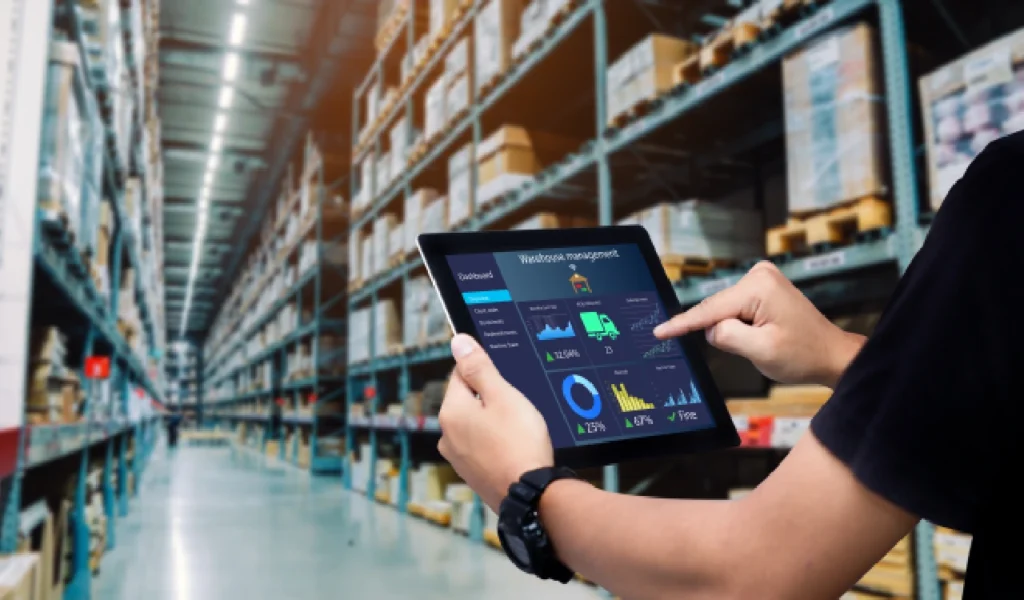The Emergence and Importance of AI in Supply Chain Management

The global supply chain involves an intricate network that delivers goods from raw materials to our doorsteps, but in the 21st century, AI in supply chain management has brought about a revolution that helps enterprises to stay ahead of the curve in the competitive market.
The emergence of AI in supply chains isn’t a recent phenomenon, but its impact has accelerated dramatically in recent years. A 2023, a McKinsey Global Institute report, ‘The economic potential of generative AI: The next productivity frontier’ states that AI has the potential to generate value equivalent to $2.6 trillion to $4.4 trillion in global corporate profits annually. This surge in adoption reflects the immense potential of AI to address longstanding challenges and unlock new levels of efficiency, resilience, and profitability.
Traditional supply chains have grappled with several limitations. Inaccurate demand forecasting, inefficient logistics, and a lack of real-time visibility often led to stockouts, delays, and rising costs. The increasing complexity of globalized networks, coupled with the growing unpredictability of external factors like weather events and political unrest, further exacerbates these issues. Let us understand the role of AI in SCM.
Learn More: From Algorithms to Action: 5 Ways AI in Supply Chain Enhances Optimization
Understanding the Role of AI in Supply Chain Management
AI, with its ability to analyze vast amounts of data, identify patterns, and make decisions with minimal human intervention, is reshaping supply chain management by streamlining processes, enhancing efficiency, and driving innovation across the entire supply chain ecosystem.
Demand Forecasting and Inventory Management
One of the key areas where AI is making a significant impact is in demand forecasting and inventory management. By leveraging machine learning algorithms, AI can analyze historical sales data, market trends, and external factors to predict future demand more accurately. This enables companies to optimize their inventory levels, reduce stockouts, minimize excess inventory, and improve overall supply chain efficiency.
Warehouse Automation with AI in Supply Chain Management
AI-powered robotics and automation technologies are revolutionizing warehouse operations by increasing speed, accuracy, and efficiency. Autonomous robots equipped with AI algorithms can navigate warehouse floors, pick and pack orders, and optimize storage space, leading to faster order fulfillment, reduced labor costs, and improved customer satisfaction.
AI in Supply Chain Management Visibility
AI is enhancing supply chain transparency by providing end-to-end visibility into the movement of goods, inventory levels, and potential disruptions. By leveraging IoT sensors, RFID tags, and AI-powered analytics, enterprises can track their shipments, monitor conditions, and proactively address issues, ensuring smoother operations and better customer service.
Read Further: A Complete Guide to Supply Chain Digitization
Benefits of AI in Supply Chain Management
With the integration of AI, benefits and opportunities are vast for enterprises who are willing to invest in artificial intelligence in supply chain processes.
Role of AI in Supply Chain Management Demand Forecasting
AI has revolutionized demand forecasting in the supply chain, making it the gold standard for accuracy. By analyzing both internal data (sales pipelines, marketing leads) and external factors (market trends, economic forecasts, seasonality), AI can help predict demand with unprecedented precision. AI not only helps estimate future demand but also anticipates the impact of unforeseen events like economic downturns or extreme weather. This foresight allows them to proactively adjust production capabilities, manage costs, and ensure on-time deliveries, creating a more resilient and responsive supply chain.
Case in Point
Amazon: Amazon employs sophisticated AI algorithms for inventory management and demand forecasting, enabling it to anticipate customer demand and optimize its supply chain operations.
Warehouse Efficiency With AI in Supply Chain Management
Machine learning models analyze the flow of materials to design optimal layouts that minimize travel time and streamline inventory movement. This includes suggesting the most efficient racking configurations and planning routes for workers and robots. Additionally, AI-powered forecasting systems, analyzing data from various sources, help maintain optimal inventory levels, preventing stockouts and overstocking, and maximizing warehouse capacity.
Case in Point
Walmart has emerged as a leader in the strategic use of AI for supply chain management. By integrating AI-powered inventory management systems, Walmart can analyze vast amounts of data to predict demand more accurately and optimize inventory flow across its 4,700 stores, fulfillment centers, and distribution network.
AI in Supply Chain Management Cost Reduction
AI’s ability to learn and handle complex situations makes it a powerful tool for reducing operating costs in the supply chain. By automating repetitive tasks like inventory management and identifying bottlenecks, AI frees up human labor and streamlines processes. Additionally, AI-powered systems can analyze data from IoT devices to predict and prevent equipment failures, minimizing costly downtime in production and distribution. This two-pronged approach of automation and proactive maintenance significantly reduces the overall operational costs within the supply chain.
Case in Point
Ford Motor Company harnesses AI for predictive analytics in its supply chain operations to anticipate and mitigate disruptions, ultimately reducing costs and enhancing manufacturing efficiency.
Timely Deliveries With AI in Supply Chain Management
The complex nature of modern supply chains, with their reliance on multiple components arriving on-time in-full, makes them vulnerable to delays. Logistics companies are utilizing machine learning to optimize delivery routes and prioritize shipments. These AI models consider factors like order volumes, deadlines, and customer importance to ensure efficient movement of components. Additionally, they provide real-time visibility into estimated arrival times, allowing for proactive intervention and preventing delays that could snowball into larger problems down the line. This translates to a more predictable and streamlined flow of goods throughout the supply chain.
Case in Point
Coyote Logistics- Coyote Logistics uses AI, and machine learning to pair customer shipment information with external data like real-time traffic and weather to predict supply chain issues and delays before they occur. This allows the company to make alternate plans to ensure shipments still arrive on time.
Sustainability With Ai in Supply Chain Management
AI is making significant strides towards a more sustainable supply chain. By optimizing logistics through machine learning, AI can reduce energy consumption. Furthermore, AI plays a role in the circular economy by analyzing product lifecycles and suggesting ways to reuse or recycle materials. The increased transparency enabled by AI-powered supply chain systems extends to supplier practices. These systems can ensure adherence to environmental and social sustainability standards, promoting fair labor practices and responsible resource management across the entire supply chain.
Read On: Learn How AI is Promoting Sustainability in Retail
Case in Point
IKEA: IKEA is utilizing AI for sustainability by implementing advanced tools and artificial intelligence to enhance its environmental impact and promote sustainable practices. The company has developed AI-driven solutions to improve demand forecasting accuracy, optimize supply chain planning, and enhance resource efficiency. By leveraging AI technologies, IKEA aims to reduce waste, lower carbon emissions, and promote a more sustainable approach to its operations. Additionally, IKEA has established robust digital ethics and AI stance to ensure ethical and responsible use of AI across its sustainability initiatives.
Challenges of Implementing AI in Supply Chain Management
While the benefits of AI in supply chain management are significant, there are also challenges associated with its implementation, such as
Data Inaccessibility
AI requires access to relevant and high-quality data to make accurate predictions and decisions, but data inaccessibility can be a major challenge in supply chains.
Functional Silos of AI in Supply Chain Management
Isolated data and knowledge within separate departments can prevent AI systems from accessing the comprehensive information they need to optimize supply chain operations.
Scalability Considerations
While many AI solutions offer scalability, achieving optimal performance may necessitate a certain threshold of initial users. This is something that supply chain partners will need to thoroughly discuss with their AI service providers because every AI system is distinct and diverse.
Human Capital Investment
Implementing AI requires staff training, representing a significant investment in both time and resources. Close collaboration with AI providers during the integration phase is crucial to develop cost-effective training solutions that minimize disruption to business productivity.
AI in Supply Chain Management Operational Cost Considerations
AI systems, while powerful, rely on complex hardware infrastructure that necessitates ongoing maintenance and potential component replacements. Supply chain partners should factor in the potential for increased energy consumption and associated electricity costs when evaluating the overall ROI of AI implementation.
Read On: Learn More About Supply Chain Challenges and How to Tackle Them in the Real World
The emergence of artificial intelligence in supply chain management has been a transformative force, driving improvements in efficiency, cost savings, and customer service. As companies continue to navigate the challenges of implementing AI in SCM, the potential benefits make it a strategic imperative for businesses looking to stay competitive in today’s dynamic global marketplace.
Read On: Check Out Our Supply Chain Glossary with Over 470+ Terms


